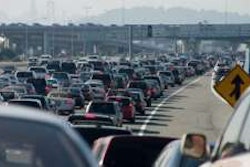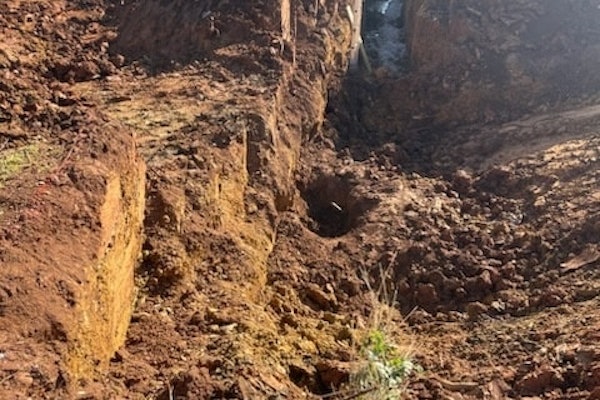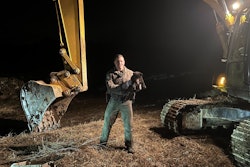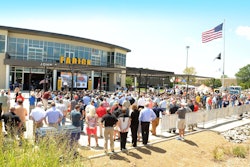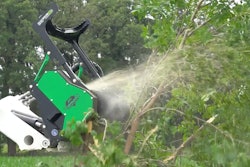by Scott F. Belcher is president and CEO of the Intelligent Transportation Society of America
As a follow up to my guest column last week on the issue of connected vehicles, and the FCC’s consideration of a plan to make the bandwidth on which they’ll operate available to unlicensed Wi-Fi devices, Better Roads invited me to write a column each week leading up to the Intelligent Transportation Society of America (ITS America) Annual Meeting to be held April 22-24 in Nashville.
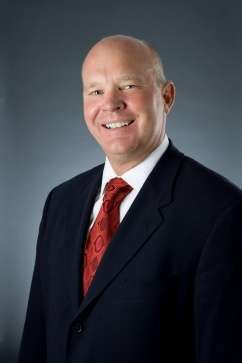 Scott F. Belcher, president and CEO of the Intelligent Transportation Society of America
Scott F. Belcher, president and CEO of the Intelligent Transportation Society of AmericaIn 2013 and beyond, it’s clear that infrastructure and technology are no longer separate. Those who build roads will use intelligent transportation systems (ITS) to measure and improve infrastructure performance and make investment decisions about road upgrades and replacement. Connected Vehicles will communicate with each other and with the infrastructure to head off accidents and reduce congestion in ways our parents could never have imagined. After all, we have the common goal of improving the driving experience for all Americans.
That said, it’s probably appropriate to tell you a little about ITS America, who we are and what we stand for.
Formed in 1991 as a Utilized Federal Advisory Committee to the U.S. Department of Transportation, ITS America now operates as a nonprofit association representing more than 450 member organizations – private businesses, government agencies and educational institutions involved in using technology to address transportation problems. One of our functions is to educate political and policy makers and ensure our members have a seat at the political and policy table as they work to improve road safety, decrease congestion, lessen our transportation carbon footprint and develop new ways to pay for the cost of providing a world class infrastructure. Simply put, we’re for better transportation systems.
Sound familiar?
During the next several weeks, I’ll tell you about many of the exciting sessions we’re planning for the annual meeting and the issues they represent. If you read my last column, you will recognize the transportation technology landscape is changing at breathtaking speed. Rest assured, those sessions will be on transportation’s cutting edge.
Of course, connected vehicles will be a major topic of discussion concerning how effective they are at talking to each other and to roadways. A massive 3,000 vehicle test is underway in Ann Arbor, Mich., and it represents the first major examination of what most agree will be the next major leap in vehicle safety, with an impact on par with seatbelts and airbags.
On Sunday [April 21] we kick off with a State DOT CEO Roundtable where we will have CEOs from more than 15 states discussing how they are deploying ITS in their states and the opportunities and challenges they see to greater deployment.
The opening plenary on Monday [April 22] will feature a keynote from the U.S. Department of Transportation and a panel of CEOs from three of the most significant telematics companies in the world – Hughes Telematics, Inc., A Verizon Company; Agero; and Airbiquity – who will discuss where vehicle telematics is heading in the future.
On Tuesday [April 23], the Modal Administrators from the U.S. Department of Transportation will offer an update on the latest ITS developments from the federal perspective. They will lay out the Department’s ITS strategic plan for our nation’s transportation system and talk about accomplishments over the last year as well as initiatives for 2013 and beyond.
Sometimes lost in the discussion is the role of technology in addressing commercial vehicle and freight needs. On Wednesday [April 24], notable leaders in research and business including moderator Dan Pallme, Director of the Intermodal Freight Transportation Institute at the University of Memphis; Dennis Beal, Vice President for Global Vehicles at FedEx; Thom Mason, Laboratory Director at Oak Ridge National Laboratory; and Brian Heath, President of Drivewyze, Inc.; will have a panel discussion on intelligent transportation from a freight perspective and how we keep it flowing on our already overburdened roadways. It should go without saying, but the lifestyle we and our families enjoy is in large part due to our ability to use infrastructure to move goods safely and efficiently.
In between these sessions, there will be discussions on every aspect of mobility including mileage-based user fees, integrated corridor management, performance measures, driverless vehicles, environmental sustainability and safer work zones among dozens of other topics.
Whether it’s infrastructure or the technology that supports it, the ITS community plays a central role in finding solutions to address our nation’s transportation challenges. With the pace of change in intelligent transportation, we expect to make news in Tennessee that will impact us all.
About the author: Scott F. Belcher is president and CEO of the Intelligent Transportation Society of America.






